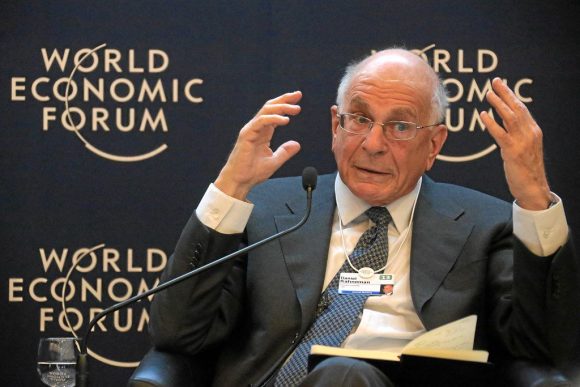Danny Kahneman died a week ago at the age of 90. He won a Nobel Prize for Economics but always saw himself as a psychologist. Jason Zweig, columnist for the Wall Street Journal, wrote a brilliant obituary for Kahneman. He knew him well after writing two books with him and part of a third before he gave up because the aggravation was killing him.
Nevertheless, the obituary was fascinating and complimentary. It taught me a lot about the man and his groundbreaking ideas.
Kahneman was born in Tel Aviv in 1934 before it was Israel. His mother was on a trip there and soon returned to France. They were there when the Nazis took over the country. He spent World War II in barns and chicken coops, fleeing the Germans. It had to have affected his view of normal behavior.
Kahneman moved to Israel after the War and got his formal education. Amos Tversky was his colleague as a college teacher and Kahneman invited him to one of his classes. They became research partners and demolished many conventional views that people’s normal behavior with money is rational.
They conducted numerous experiments, almost childlike in their simplicity, that confirmed that most folks make stupid financial decisions and many other daily choices in life. For instance, they showed that pain from losses is almost twice the sensation as the joy derived from gain.
The reality is that losses are terrible to contemplate, so we stick with losers and sell off the winners. The losers are much more likely to stay losers and the winners are more likely to continue positively.
I have a lot of old Acme and Wickman screw machines in our warehouse which are testimonials to my reluctance to admit errors to my colleagues.
Kahneman argued that people do not incorporate all available information. We think jackpots happen more often than they do. We think our hot streaks will continue and they don’t. Stocks that are sold go up more often than stocks held onto.
New businesses have an 80% chance of failure within five years, which does not mean you shouldn’t start one, but you should know the probabilities.
Kahneman knew the likelihood of marriages ending in failure is higher than 50%. When he proposed to his second wife he told her that “the base rates are against us.” He said, “I’m Jewish, you’re not. I’m neurotic, you’re not.”
Their marriage lasted 40 years until his wife Anne died in 2018.
Jason Zweig, who wrote the article, said he learned many things from his collaboration with Danny Kahneman. Because he saw everything through a child’s eye, Kahneman’s first question was always “Why?”
He never assumed that the status quo was valid. He always wanted to know if it made any sense.
He was relentlessly self-critical. Zweig once showed him a letter he had received from a reader telling him in a nasty fashion how wrong he was. It was correct, but it was hurtful.
Kahneman told him, “Do you know how lucky you are to have thousands of people who can tell you that you are wrong?”
They eventually stopped writing together because Kahneman rewrote most of Zweig’s pages, yet they both had great respect for each other.
After reading the article, I vowed to sell off my losers. Of course, I have not acted on the idea yet.
Danny Kahneman was a brilliant scholar who taught the world. When asked how he would describe himself, he said “miserable,” but he made many lives better with his insights.
Question: What are some of the “unprecious” things that you’ve held onto?


4 Comments
Something like ten cheap dial calipers, leftovers of what my dad bought to hand out to his SPC students at Dana Corporation.
Old baggy dress pants, shoes that no longer fit, old Surplus Records, Tony Robbins cassette tapes, old copies of Screw Machine World, unread books
Those unread books and comfortable sweatpants are hard to get rid of.
One of my favorite life coaches had a podcast last year where she discussed the habits of her friends who keep things even if they do not work, with plans to fix them that never come to fruition. I admit I’ve been guilty of That. Old laptops, cords, and other electronics that have something that once mattered to me still on them but I haven’t seen whatever it is in probably 7 years. That, and costuming and clothing that I haven’t been able to fit in in probably at least 2 years and have no real use for anymore.
I have been on a simplicity kick lately. It goes beyond whether or not something is making you money or saving you money. You have to get rid of stuff if you are just hanging on to it, as space in many cases can also be money. And the time and hassle that comes with getting rid of things with very little payout often isn’t worth it. Just give it away or throw it out if it no longer has any use to anyone. That’s been the most difficult part for me. Admitting that not only is the stuff useless to me but it’s probably useless to everyone else as well.